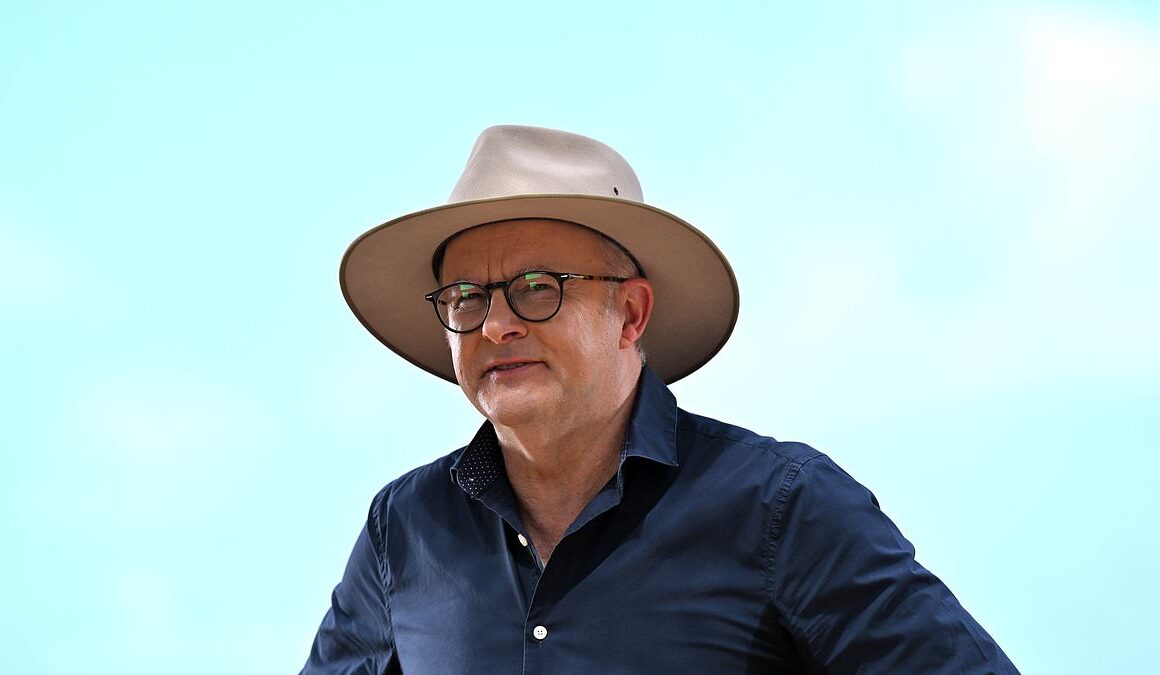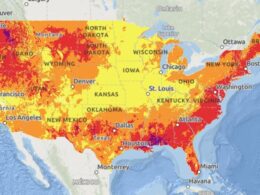Anthony Albanese sparked outrage after saying he was still committed to Makarrata despite Australians overwhelmingly voting down the Voice referendum.
The Prime Minister made the comment at the Garma Festival, on a ceremonial site in northeast Arnhem Land, in the Northern Territory on Saturday.
‘We remain committed to Makarrata, that powerful Yolngu word gifted to the nation, for a coming together after a struggle’ Mr Albanese told the crowd.
The comment sparked outrage, with many Aussies calling out the failed Voice to Parliament referendum in October 2023, which saw 60 per cent of Aussies vote No.
Mr Albanese clarified on Sunday that his government would not pursue a Makarrata Commission – which was one of the key pillars of the Uluru Statement from the Heart and seen as a path to treaty – and instead supported only the concept of Makarratta.
‘We voted NO why is it so hard for you to comprehend?’ one outraged Aussie wrote on social media platform X.
‘NO means NO! We do not consent to reparations and treaties, we do not consent to division on the basis of race, we do not consent to separatism. We are ALL Australians,’ a second commented.
‘I can’t remember there being a maybe option on the referendum. Pretty sure it was yes and no and we went with no. Weird to be pushing so much against a majority of the population,’ a third person chimed.

Mr Albanese arrived at the Garma Festival, on the ceremonial site in northeast Arnhem Land, on Friday and was led through the grounds by memebers of the Dhalwangu Clan (pictured)
A fourth added: ‘You wasted half a billion on attempted virtue signalling – you are a big part of the problem’.
Mr Albanese arrived at the Garma Festival on Friday and was led through the grounds by members of the Dhalwangu Clan.
The festival is the largest Indigenous gathering in Australia and is used to celebrate the life and culture of the Yolngu people.
The prime minister joined the newly sworn-in Indigenous Australians Minister Malarndirri McCarthy at the Gulkula site.
In an address on Saturday, Mr Albanese said his government’s commitment for a ‘better future for First Nations people’ was ‘stronger than ever’.
‘We remain committed to Makarrata, that powerful Yolngu word gifted to the nation. It simply means this: coming together after a struggle,’ Mr Albanese told the crowd.
‘I sometimes get asked by journalists about Makarrata and I say the definition. And I say, surely no one’s against the fact that there’s been a struggle.
‘And no one surely can be against the principle that after a struggle, people should come together. That’s all that it means’
‘We’ll continue to engage in good faith with leaders and communities to decide what the steps should be at a national level,’ Mr Albanese aded.
Mr Albanese explained his government was committed to confronting the ‘legacy of dispossession and take the realities of disadvantage’.
‘My colleagues and I came to Garma to renew our commitment to a better future for First Nations people,’ Mr Albanese said.
‘We will leave here more determined than ever to bring it into being. Let us continue to work together to that better future.’
However, Mr Albanese later said his government would not pursue a Makarrata Commission – one of the three pillars of the Uluru Statement from the Heart.
‘That’s not what we have proposed,’ Mr Albanese told the ABC’s Insiders program at the Garma Festival on Sunday.
‘What we have proposed is Makarrata just being the idea of coming together.
‘Ongoing engagement is what we do with coming together. Now, that might take forms as it evolves… I don’t pre-empt it.
‘What it means is listening to and respecting First Nations people and then responding.
‘We know that what we’ve been doing up to now where more than half, or more than two thirds, tragically, of the Closing the Gap targets currently aren’t on track to being met.
‘So we can’t just do things the same way. And part of that, of course, involves and must involve listening to people who are directly affected.’
He said the process to oversee treaty and truth-telling would take different ‘forms’ in the future.

Mr Albanese said his government would not pursue a Makarrata commission
He added treaties were being pursued by the states and territories separately, prior to and following the referendum. with the government not planning a truth and justice commission.
‘That’s at different stages, and that is appropriate given that there are different views and not one homogenous grouping around the country,’ he said.
‘We weren’t progressing a national treaty before the referendum. What was occurring was that states and territories were acting on that.
‘With regard to Makarrata, a Yolngu word that simply means a coming together after struggle, I’m somewhat perplexed at why people see that as being complex.
‘Obviously, there has been a struggle for First Nations people. That’s why we talk about Closing the Gap, or what is really a chasm in some areas.
‘And coming together is a principle of walking together, that engagement. It’s not a moment in time. It’s a process of coming together after struggle.’







